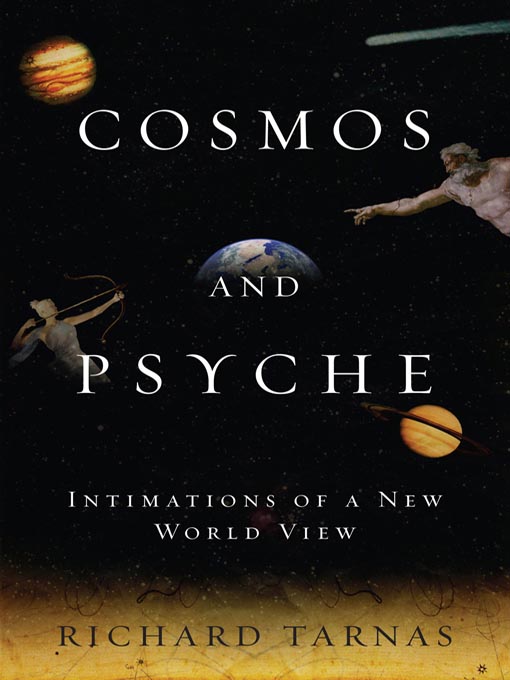In these pages, distinguished philosopher and cultural historian Richard Tarnas traces the connection between cosmic cycles and archetypal patterns of human experience. Based on thirty years of meticulous research, and on thinkers from Plato to Jung, Cosmos and Psyche explores the planetary correlations of epochal events like the French Revolution, the two world wars, and September 11.
This brilliant book points to a radical change in our understanding of the cosmos, shining new light on the drama of history and on our own critical age. It opens up a new cosmic horizon that reunites science and religion, intellect and soul, modern reason and ancient wisdom. Whether read as astrology updated for the quantum age or as a contemporary classic of spirituality, Cosmos and Psyche is a work of immense sophistication, deep learning, and lasting importance.
-
Creators
-
Publisher
-
Release date
November 12, 2008 -
Formats
-
Kindle Book
-
OverDrive Read
- ISBN: 9781101213476
-
EPUB ebook
- ISBN: 9781101213476
- File size: 2788 KB
-
-
Languages
- English
-
Reviews
-
Publisher's Weekly
December 12, 2005
According to Tarnas, acclaimed author of The Passion of the Western Mind
, history is on the verge of a major shift, comparable to the one wrought by Copernicus and Galileo, but a seemingly antiscientific one: an astrological turn that can only be understood thorough chronicling planetary alignments as they correlate to the rise of the modern mind over the last 500 years. Understanding planetary alignments, for Tarnas, is crucial to the world's future and requires "a genuine dialogue" with the cosmos, by "opening ourselves more fully" to "the other," to ancient and indigenous epistemologies, even "to other forms of life, other modes of the universe's self-disclosure." Filled with philosophical, religious, literary and scientific thinking ranging from Luther and Kepler through Hemingway and even Hitchcock and Dylan, Tarnas's book is not only sweeping in subject but dense and sometimes painfully slow going. It requires at once a strong background in the history of modern thought, an advanced knowledge of astrology, a willingness to withhold skepticism about the role of planetary alignments of the past in understanding life today and the avoidance of imminent world catastrophe. Tarnas's call to redefine what we consider as "legitimate knowledge" will resonate in some sectors, but it will be a tough sell with the more scientifically hardheaded. -
Library Journal
February 1, 2006
In this sequel to "The Passion of the Western Mind", Tarnas (philosophy, cosmology, & consciousness, California Inst. of Integral Studies) opens with an overview of the -modern self, - paying special attention to the impact of the Copernican revolution. He then begins a discussion of the psychological aspects of this modern self, building up to Carl Jung's analysis of the phenomenon of synchronicity. This discussion serves as the springboard for the rest of the book: cosmological archetypes and the principles of astrology. Tarnas cites an abundance of examples drawn from historical individuals, cultural eras, political events and revolutions, scientific discoveries, literary developments, and artistic innovations that correspond to various planetary alignments. He persuasively argues that a logical shift on the order of the Copernican revolution is necessary in order for modern individuals to analyze better the past and present (and to some extent the future). At times, however, the material seems to do little more than summarize planetary alignments and corresponding events. If nothing else, Tarnas succeeds in pointing out overwhelming coincidences that will undoubtedly be difficult for readers to disregard. Recommended for medium and large collections." -Jason Moore, Madison Cty. Lib. Syst., MS"Copyright 2006 Library Journal, LLC Used with permission.
-
Booklist
January 1, 2006
World history is vast and confusing. How to find coherence? Tarnas thinks the answer lies in astrology. Possessing a tremendous amount of historical knowledge, the author correlates human history's big events and personalities with the orbits of Jupiter, Saturn, Uranus, Neptune, and Pluto. Why only Pluto, but not Pluto-size objects (or, for that matter, extrasolar planets) recently discovered, should reign over us goes unexamined, but be that as it may, Tarnas discusses charts, planetary alignments, and archetypal personality traits embodied by the planets so aligned. Reaching into mythology and Jungian psychology, Tarnas associates history makers with, for example, a Neptune-Pluto conjunction. Averring an empirical basis to his research, Tarnas proves a determined writer whose fortress of connected dates, historical trends, and philosophical thought defies would-be challengers to his cosmic viewpoint. Casual astrology buffs and readers of the daily horoscope may find this volume heavy going. This is a book for those who are as intrigued by and as convinced of astrology's validity as Tarnas.(Reprinted with permission of Booklist, copyright 2006, American Library Association.)
-
Formats
- Kindle Book
- OverDrive Read
- EPUB ebook
subjects
Languages
- English
Loading
Why is availability limited?
×Availability can change throughout the month based on the library's budget. You can still place a hold on the title, and your hold will be automatically filled as soon as the title is available again.
The Kindle Book format for this title is not supported on:
×Read-along ebook
×The OverDrive Read format of this ebook has professional narration that plays while you read in your browser. Learn more here.



